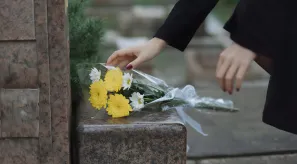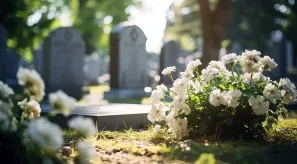Burial or cremation? It is a difficult decision to make when a loved one dies and various factors need to be considered: religious beliefs, family customs, financial situation, geographical location, wishes of the deceased, practicality…
This is why it is important to have as much information as possible about both processes: Which is more expensive, a cremation or burial? Which is better, a cremation or burial?
Direct cremation process
Direct cremation is a type of funeral in which the body of the deceased person is cremated shortly after death, without a wake and/or ceremony.
The ashes of the deceased person are placed in an urn and delivered to the family.
It is an irreversible process, so it is important to make a clear decision between a cremation and burial.
Advantages of a direct cremation
Those who have to decide between a cremation or burial and choose the first option base their decision on the following benefits:
- It is a simpler, faster and more practical process.
- With a cremation, the body of the deceased is turned into ashes within hours. A traditional burial, on the other hand, involves a slow natural decomposition process.
- In the absence of a concessionary burial (niche, columbarium, pantheon), cremation is more cost-effective than a burial.
However, it should be noted that those who choose cremation also face another complicated decision: what to do with the ashes of your loved one?
The burial process
Relatives who have to choose between cremation or burial and choose the second option choose the most traditional funeral service, as it is a custom that is present throughout the world and associated with different religions and cultures.
The burial consists of the burying of the deceased person. The process is usually done inside a coffin and in a cemetery.
The burial can be underground or in a niche, although there are also other options such as pantheons or private graves.
Advantages of a burial
When a family chooses the burial option when a loved one passes away, their decision is based on things such as:
- From an emotional point of view, a burial gives the family members a physical place to visit so they can remember their deceased loved one.
- There are several burial options for families.
- The family can personalise the choice of the coffin, the tombstone and even the location in which the deceased will be buried.
Despite these advantages, when choosing between cremation or burial, the negative aspects of the latter must be taken into account. It is less cost-effective, there are certain limitations in cemeteries that must be taken into consideration, burial maintenance is necessary and it may even have a greater ecological impact.
Which is cheaper, cremation or burial?
When choosing between cremation or a burial, price is an important factor to consider. A burial is more expensive than a direct cremation as it involves a series of additional costs that, in many cases, are unavoidable:
- Embalming of the body. Wake room rental and farewell ceremony afterwards.
- Rental and maintenance of a niche, tomb or pantheon. The rental of space in a cemetery is more expensive.
- Maintenance expenses of the grave.
- Costs to carve the tombstone.
- The transfer of the body by funeral car to the cemetery also involves an extra expense.
So which is better, cremation or burial? From an economic perspective, it is clear that cremation is the cheapest option. And, in many cases, this can be a determining factor in making this difficult decision.
Which option is more environmentally friendly, cremation or burial?
Something else which more and more families are using to base their decisions on when choosing between a burial or cremation is the environmental impact created by each of these processes.
Although burial may be thought of as the greener option, the reality is that cremation services increasingly use special filters in their crematoriums to reduce CO2 emissions into the atmosphere and pollution during cremation. And there are so many deaths in the world that burial processes have become very polluting due to the materials that are used. With this in mind, we are increasingly using other materials of a biodegradable nature.
However, this is not always the case as the shrouds themselves, the products used for embalming or the medicines the deceased person may have ingested before dying can be pollutants.
In addition, with burials the decomposition process of the body is natural so it is also slower, which can also influence the environmental impact.
Therefore, cremation can be less environmentally harmful, especially if you hire a company that offers more ecological funeral services.



